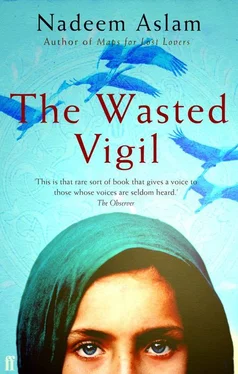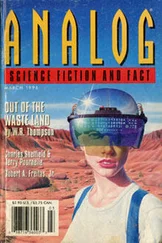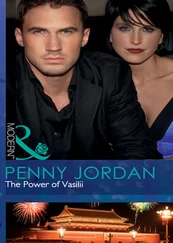Nadeem Aslam - The Wasted Vigil
Здесь есть возможность читать онлайн «Nadeem Aslam - The Wasted Vigil» весь текст электронной книги совершенно бесплатно (целиком полную версию без сокращений). В некоторых случаях можно слушать аудио, скачать через торрент в формате fb2 и присутствует краткое содержание. Год выпуска: 2009, Издательство: Faber and Faber, Жанр: Современная проза, на английском языке. Описание произведения, (предисловие) а так же отзывы посетителей доступны на портале библиотеки ЛибКат.
- Название:The Wasted Vigil
- Автор:
- Издательство:Faber and Faber
- Жанр:
- Год:2009
- ISBN:нет данных
- Рейтинг книги:4 / 5. Голосов: 1
-
Избранное:Добавить в избранное
- Отзывы:
-
Ваша оценка:
- 80
- 1
- 2
- 3
- 4
- 5
The Wasted Vigil: краткое содержание, описание и аннотация
Предлагаем к чтению аннотацию, описание, краткое содержание или предисловие (зависит от того, что написал сам автор книги «The Wasted Vigil»). Если вы не нашли необходимую информацию о книге — напишите в комментариях, мы постараемся отыскать её.
The Wasted Vigil — читать онлайн бесплатно полную книгу (весь текст) целиком
Ниже представлен текст книги, разбитый по страницам. Система сохранения места последней прочитанной страницы, позволяет с удобством читать онлайн бесплатно книгу «The Wasted Vigil», без необходимости каждый раз заново искать на чём Вы остановились. Поставьте закладку, и сможете в любой момент перейти на страницу, на которой закончили чтение.
Интервал:
Закладка:
Casa was present at a camp at the exact moment the missiles landed. He had been bowing before Allah and had just raised his forehead from the prayer mat. The needle of the small compass fitted at the head of the mat — to allow the faithful to always find the direction of Mecca — had started to spin at great speed just as it did in lightning storms. He was severely injured but Allah had spared his life, having better plans for him.
Because no true Muslim should shrink from killing in cold blood, his jihad training had included slitting the throats of sheep and horses while reciting the verse from the holy Koran which gives permission to massacre prisoners of war: It is not for the Prophet to have captives until he has spread fear of slaughter in the land. In the laboratories of the camps, stocked with labelled drums of various acids, acetones, cellulose, wood composite and aluminium powder, he had learned to mix methyl nitrate, had hit a small drop of it with a hammer to see it shatter the hammer. He blew up a car with a sack of fertiliser and ammonium nitrate fuel oil, the burning chassis travelling in an arc through the air to land a hundred yards away. He crumbled a boulder with twenty pounds of US-made C-4, and, for comparison, others with C-1, C-2, and C-3, and also with Czech Semtex. He knew the Americans were trying to get back from the Afghans the Semtex they had supplied for use in the Soviet jihad, so dangerous was the substance. During all this he chanted the sacred words of the Koran. I will instil terror in the hearts of the Infidels, strike off their heads, and strike off from them every fingertip .
The faces of women are on display around him but he keeps his eyes off them as he walks. Nowadays he doesn’t think of such matters but at one time he had dreamed of a wife, preferably one of the thousands upon thousands of Bosnian women who had been raped by the Serbs, many of them becoming pregnant so that the Bosnian men banished them. These men couldn’t contemplate raising a child who was half enemy. But Casa and his brothers at the camps and madrassas had felt it their duty to marry these women, and raise their children to become jihadis, who could go on to slaughter the Serbs whose blood they shared.
He arrives at the crossroads where someone is to pick him up. To take him to Nabi Khan at the poppy farm. There they’ll get ready and wait. Tonight, under cover of darkness, he and four others are going to Usha.
IN CITY OF GOD St Augustine records his belief that the peacock’s flesh has the God-given property of resisting putrefaction after death. Marcus withdraws his hand from deep within the bird’s breast, having plunged the scissors into the topiary figure to snip at a branch. He is in the shattered glasshouse to the west of the house, most of its panes missing. The candle flame shudders as he turns around, suddenly aware of the three men standing at the lake’s edge. He walks to the house where Lara sits reading by lamp at the kitchen table.
‘Stay in here, Lara,’ he says to her without stepping in. ‘But could I please have the light for a moment?’
She stands up perhaps too fast. In a moment of vertigo she has experienced before with the books in this house, she feels as though the things printed on the paper would drain away through the hole in the centre of the page. From the door she sees him disappear along the curved path, catching the last hint of his greyed blue jacket amid the rustle of the long grasses.
She is in darkness. She switches on the cell phone she brought with her from St Petersburg, though there is no signal for it here. In the silver haze of its light she goes out and moves along the path until she can see him in the distance, talking to the three figures near the tree split in two by Qatrina’s despondent love for her countrymen.
She stands there and then David arrives from his day in Jalalabad, the beams of the car scattering on the low foliage. He gets out and joins the group, a voice from there drifting towards her whenever the wind spins around — she realises she has begun to recognise the voices of these two men.
‘The doctor in Usha is away for a few days,’ David walks up and tells her. ‘One of the old men out there got injured last week but the wound he thought was healing is suddenly giving him trouble today. He’s hoping Marcus can help.’
They will not come into the house, she knows, afraid of the ghost of the perfume maker’s daughter. Of the Buddha, the suffering stone that had bled gold, that had been granted life by bullets.
‘I’ll get more light, to make it easier for Marcus.’
When she had appeared at Usha and asked for Marcus, she was mistakenly brought to the current doctor’s house, and his young daughter — the teacher at the one-roomed school Gul Rasool has permitted in Usha to please the United States — had lovingly taken charge of her. Before leaving for Russia she intends to visit the girl.
She follows David towards the lake, bringing a hurricane lamp and a flashlight. All things considered, the Afghans she has met have been helpful and kind towards her — with the exceptions of the boy who attacked her with the tyre iron, and the guide she had hired to bring her from Kabul to Usha, who had absconded with most of her money one night.
Marcus is leaning towards the bloody shoulder of the man sitting on a tree stump, and now with a sound of astonishment he extracts a piece of paper from within the gash. It is blood-soaked and folded tight to the size of a coin. The man attempts an explanation while Marcus tries to spread it to its full size: what appear to be verses of the Koran are written on the paper. As she doesn’t understand the language the aged man is speaking, Marcus explains,
‘It is a talisman. Given to him by someone at the mosque to make the wound heal. Instead of just wearing it around his neck he has inserted it into the wound, thinking it’ll speed up the process! That is why the bleeding won’t stop.’
She can smell the injury, the small percentage of blood in the air.
The man takes the paper from Marcus’s hands and begins to fold it again, both of them shaking their heads at each other and talking very fast — he obviously wishes to slot the holy words back under his skin.
The three strangers steal glances at her from time to time, their faces lovely to her, the beard of one fox-orange with henna, the eyes of another an uncontainable grapeblue. And Islam and its love of flowers! They have helped themselves to a pink rose from somewhere and are passing it between themselves.
One of the men, his skin the colour of violins in this light, says something in her direction. She realises it is ‘ Rus .’
Russia.
She nods.
‘ Rus, ’ the man says again, grinning. And he makes a comment which elicits an identical reaction of surprise from David and Marcus. They ask him questions and soon the other visitors begin to contribute — a discussion with many gestures.
‘What are they saying?’ she asks, smiling. Old timers. Perhaps one of them had visited Russia in the past. She tells herself to restrain the expression on her face — her guide had told her that she smiles too much for a woman. One of the men shakes the rose in his hand, thrusts it at the others.
The talk continues and then she hears one of the men clearly and carefully utter the name Benedikt, syllable by syllable.
She is suddenly numb.
‘What did he just say?’
‘Nothing,’ David replies but she catches him exchange a glance with Marcus.
‘Didn’t he say Benedikt?’
‘No, no.’
A man is now drawing a shape on the dust between his feet. A lobed oblong with a stalk. An oak leaf? Like the one she has, like the one Benedikt carried with him. Or is she mistaken? It could just as easily be a quick map of Afghanistan.
Читать дальшеИнтервал:
Закладка:
Похожие книги на «The Wasted Vigil»
Представляем Вашему вниманию похожие книги на «The Wasted Vigil» списком для выбора. Мы отобрали схожую по названию и смыслу литературу в надежде предоставить читателям больше вариантов отыскать новые, интересные, ещё непрочитанные произведения.
Обсуждение, отзывы о книге «The Wasted Vigil» и просто собственные мнения читателей. Оставьте ваши комментарии, напишите, что Вы думаете о произведении, его смысле или главных героях. Укажите что конкретно понравилось, а что нет, и почему Вы так считаете.












